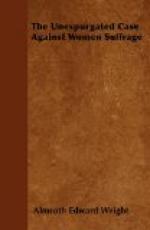The rational legislator whom we have here in view would accordingly always take expert advice as to whether the desired object could be achieved by legal compulsion; and as to whether a projected law which satisfied the condition of being workable would give a balance of advantages over disadvantages.
In connexion with a proposal for the prevention of sweating he would, for instance, take expert advice as to whether its provisions could be enforced; and whether, if enforceable, they would impose added hardships on any class of employees or penalties on any innocent class of employers.
In like manner in connexion with a proposed modification in criminal procedure, the rational reformer would defer to the expert on the question as to whether such modification would secure greater certainty of punishment for the guilty without increasing the risk of convicting the innocent.
In connexion with the second category of evils—the category under which would come those of drinking and betting—the rational legislative reformer would recognise the complete impracticability of abolishing by legislative prohibition physiological indulgences and the evils which sometimes attend upon them.
He would consider instead whether these attendant evils could be reduced by making the regulating laws more stringent; and whether more stringent restrictions—in addition to the fact that they would filch from the all too small stock of human happiness—would not, by paving the way for further invasions of personal liberty, cripple the free development of the community.
On the former question, which only experts could properly answer, the reasonable reformer would defer to their advice. The answer to the last question he would think out for himself.
In connexion with the evils which are deliberately inflicted by man with a view to reaping either personal profit, or profit for the nation, or profit for humanity, the reasonable reformer would begin by making clear to himself that the world we live in is not such a world as idealism might conjure up, but a world of violence, in which life must be taken and physical suffering be inflicted.
And he would recognise that the vital material interests of the nation can be protected only by armed force; that civilisation can be safeguarded only by punishing violations of the criminal law; and that the taking of animal life and the infliction of a certain amount of physical suffering upon animals is essential to human well-being, comfort, and recreation; and essential also to the achievement of the knowledge which is required to combat disease.
And the reasonable reformer will, in conformity with this, direct his efforts, not to the total abolition of war, but to the prevention of such wars as are not waged for really vital material interests, and to the abatement of the ferocities of warfare.
In the case of punishment for criminals he would similarly devote his efforts not to the abrogation of punishments, but to the relinquishment of any that are not reformatory, or really deterrent.




